Mary & George’s Tony Curran on gay roles and giving Nicholas Galitzine a ‘Glasgow kiss’ during an intimate scene
Exclusive: "All of a sudden you're in a Caravaggio painting," says the Scottish actor as he chats to Attitude about playing a queer British monarch and gay sex scenes

I’m alerted to the imminent arrival of Tony Curran as his strong Glaswegian accent carries down the hall of the Corinthia Hotel in London. He enters seconds later full of warmth and spirit, despite being busy with other press interviews and it’s not even 10am.
The Scottish actor, 54, looks cool and fresh, radiating an infectious energy that brightens up the hotel room in contrast to the dreary Great British weather outside. Dressed casually in jeans, a t-shirt, and a jumper with bracelets jingling on one wrist and a watch on the other, Curran is the very picture of cool dad vibes. His ginger hair is perfectly tousled and his sharp blue eyes are vibrant and piercing in the morning light.
Diving into his latest project, Mary & George, Tony is engaged, present, and willing to get into things. We discuss his familiarity with the story of Mary (Julianne Moore) and George Villiers (Nicholas Galitzine) and their plot to rise up the social hierarchy of Jacobean England through King James I of England VI of Scotland. As is likely the case with many, it’s not a story Tony was familiar with at all. However, he did his research. He speaks expertly throughout our interview about the history of King James and the time period. Mary & George is “long overdue,” he opines. “I think it’s a story that many people won’t have heard but hopefully they’ll be compelled by.”
I recall my own experiences in history classes at school. We touched on this era of history but in light detail and never anything queer. So often stories like the relationship between George and King James have been sidelined or erased entirely in favour of more digestible narratives. Tony, who has his own theories (“James was [also] seen as weak because he brokered peace with the French, with the Spanish”), concurs. “It’s very important that this is readdressed and looked at because it’s unfair.”
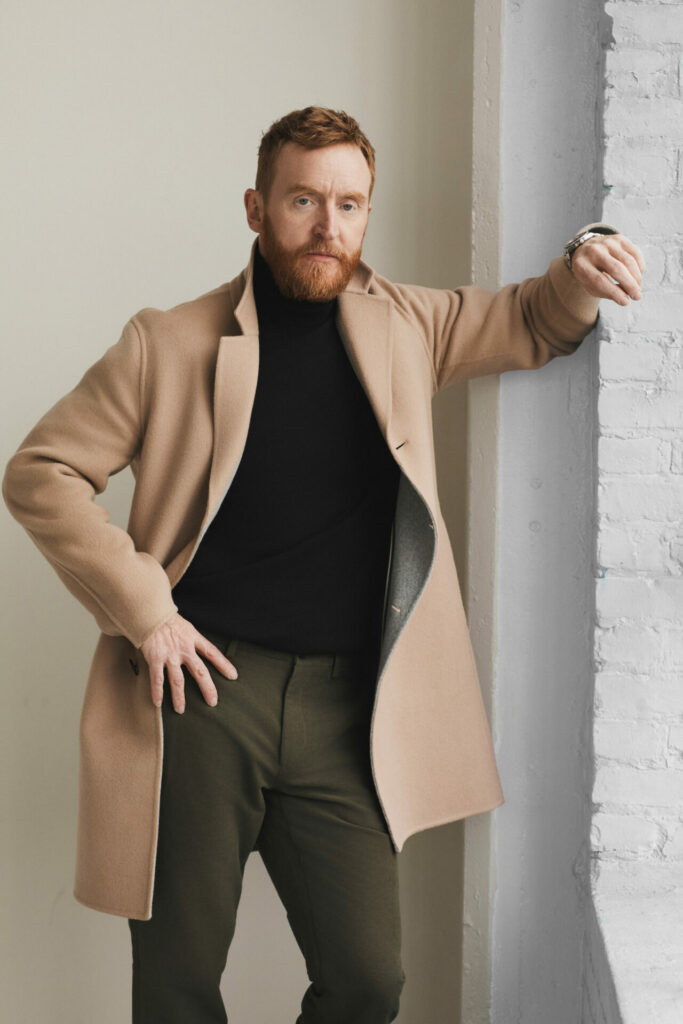
King James’ relationship with George is well documented in letters between the two. As depicted in Mary & George, same-sex male relationships were somewhat taken for granted. Still, only getting a piece of historical fiction telling a queer story when there have been others about non-queer relationships feels like a double standard, no?
“They say that history is written by white men, the victors,” offers Tony wisely. “But because he was seen as a man who fell in love with other men, and was perceived as weak because he didn’t go to war, [there] are definitely elements which could have contributed to the fact that we just push him to the side. But then the hypocrisy of that rankles with me, and with many of my LGBTQ friends. Frankly, no matter your background, everybody should be represented.”
As far as representation goes, Mary & George feels like a win. Not only is a queer male relationship explored on screen, but other characters explore other queer identities too. That these stories are given time to develop and have been backed by what must have been large budgets is reassuring that queer stories are being taken seriously. Tony celebrates the progress that’s been made in getting “characters that are portrayed interestingly” rather than stereotypes while recognising the strides yet to be made. His words for the haters: “Chill out. It’s part of human nature.”
“It just happens to be these men are together in love. Mary & George is bigger than that, it’s more human”
One of the most refreshing things about Mary & George is the treatment of intimate scenes as nothing salacious. Each feels necessary, driving the plot forward as the characters, namely George and James, engage in an initially transactional relationship. Exploring the conversations about how they approached these scenes, Tony shares that they were just as focused on depicting a tender and caring love.
“It was about human desire, yes, but there was a tenderness between two people that transcends whether you’re a man or a woman. It’s more about two souls connecting. That’s what we tried to do. It just happens to be these men are together in love. The story is bigger than that, it’s more human; we felt anyway.”
The sex scenes feel as much about an exchange of power as they are about carnal affection, much like Showtime’s Fellow Travelers. Over the series, the roles and positions characters take reflect their position and their trajectory. At first, George is helping James bathe accompanied by James’ other bed chamber fellows. Then as their bond deepens, George takes a more active role within the King’s court, an unintentional euphemism.
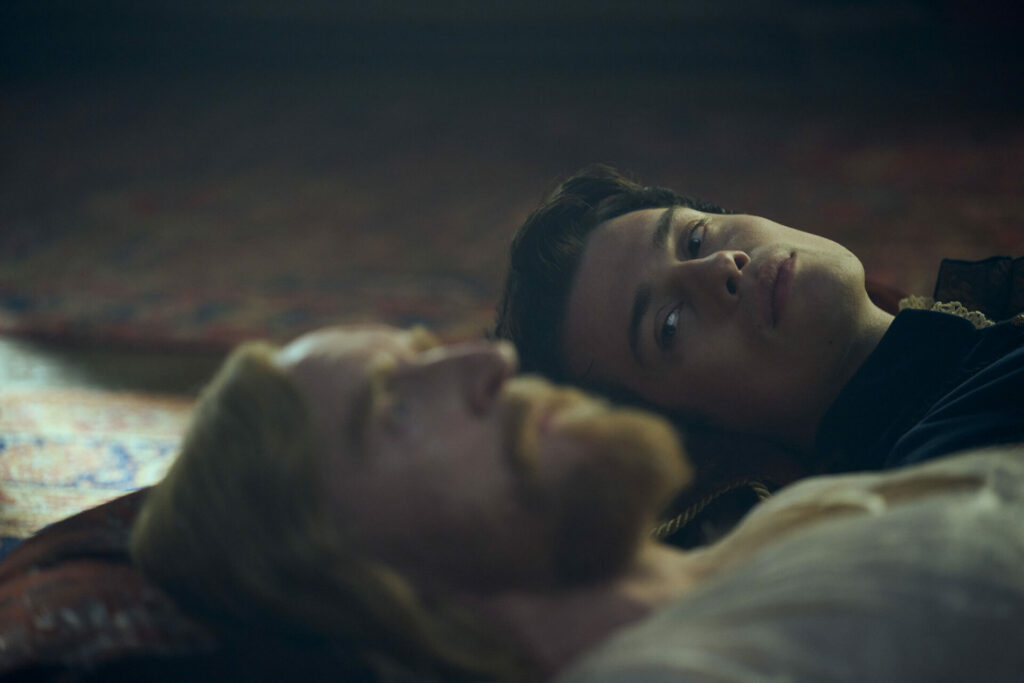
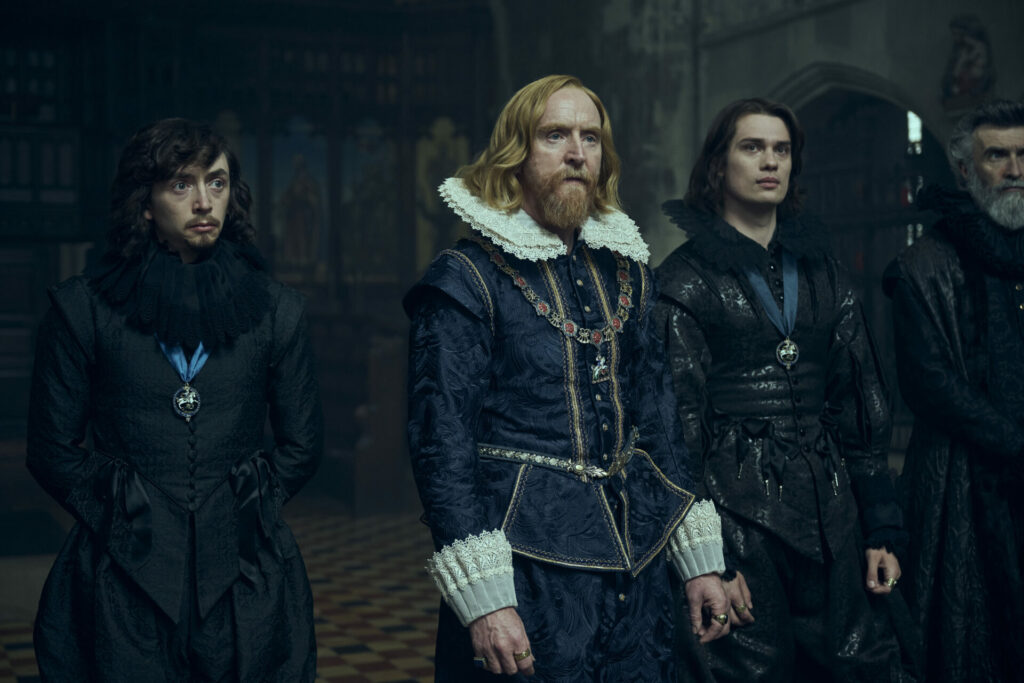
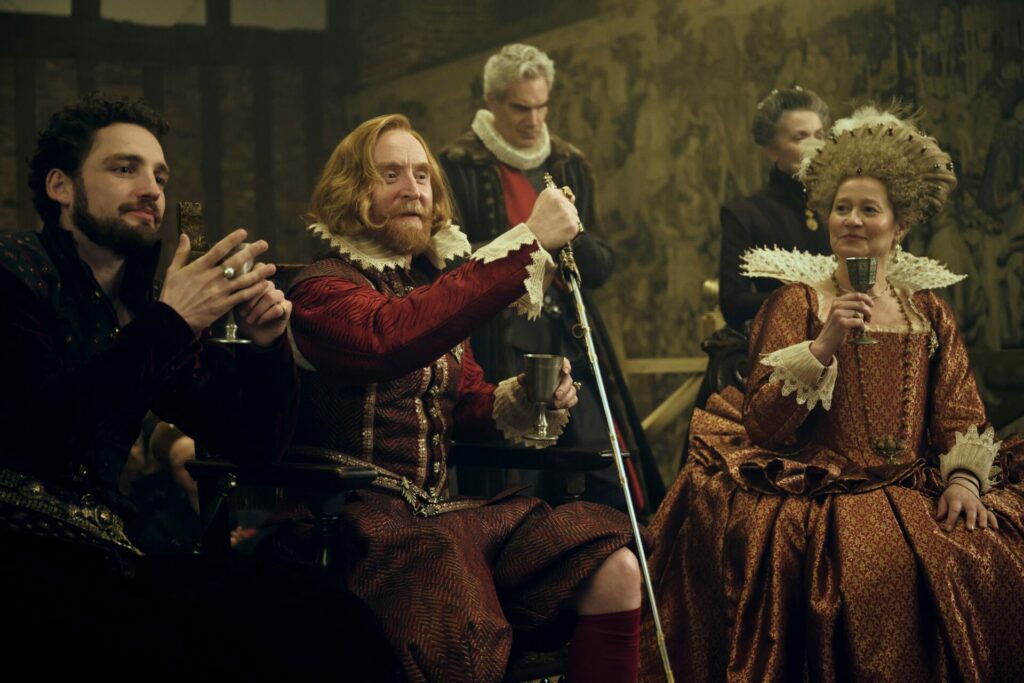
“I guess it shows the audience that these men are becoming more intimate,” says Tony bringing up James’ backstory – his mother Mary Queen of Scots being executed, his father assassinated, and James being kidnapped at 13. “Ben [Wooley, author of the book The King’s Assassin: The Secret Plot to Murder King James I on which the show is based] said James was nourished in fear. His paranoia was justified in that sense. The idea of losing yourself in the clench of another was definitely something. There’s a term that if you can’t find meaning, you’ll find distraction. James is trying to find both. I think he found it with [the Earl of] Somerset (another of James’ lovers) and obviously with George Villiers. But I don’t deny for a minute that he cared deeply about these men. The sensuality adds to the whole picture.”
His chemistry with Red, White & Royal Blue‘s Nicholas Galitzine helped, Tony divulges. “He’s a hoot, very charming and funny. I don’t know if I could have achieved what I achieved and him the same,” he shares further. “I think levity onset helped a lot.” Though sex scenes come with an inherent risk, it would appear. “I may have head-butted him once during a sensual dalliance. I gave him a Glasgow kiss.”
Intimacy coordinators have added a necessary level of security for actors in these moments to feel they can work knowing everyone is cared for. Tony describes it as being “very professional” with scenes broken down to which hand goes where like a bizarre game of Twister. The results however speak for themselves with an authentic depiction of queer sex on screen. “All of a sudden you’re in a Caravaggio painting,” laughs Tony referencing the occasions he’d check the monitors on set. “It looks, dare I say, beautiful.”
“The opportunity to play any character gay or otherwise is a great honour”
An overriding thought as I watched the series before the interview was that I hadn’t seen a queer story like this in this genre. “Sadly, it’s a shame that it hasn’t,” says Curran when I ask if he can imagine a show like this being made any earlier than 2024. “I did a show in the 90s called This Life. That was ahead of its time.” Reflecting again on representation he goes on to say: “It grates me that people aren’t represented and people still have some homophobia, which saddens me. [It] makes me angry as well to be perfectly honest.”
Counter to more clichéd gay characters, Lenny the plumber was like anyone else, he just happened to be gay. “It was refreshing to see someone represented who had many other facets to them,” Tony carries on. “It wasn’t like, ‘This is a story about two men and their relationship,’ they just happened to be queer. And their love, like George and James’ love for each other, is no more or less sincere than a woman and a man or a woman and a woman. Love is love.” Pausing momentarily he adds, “I sound like John Lennon now,” with a mirthful laugh. “But that’s what I believe. And that’s what King James believed as well.”
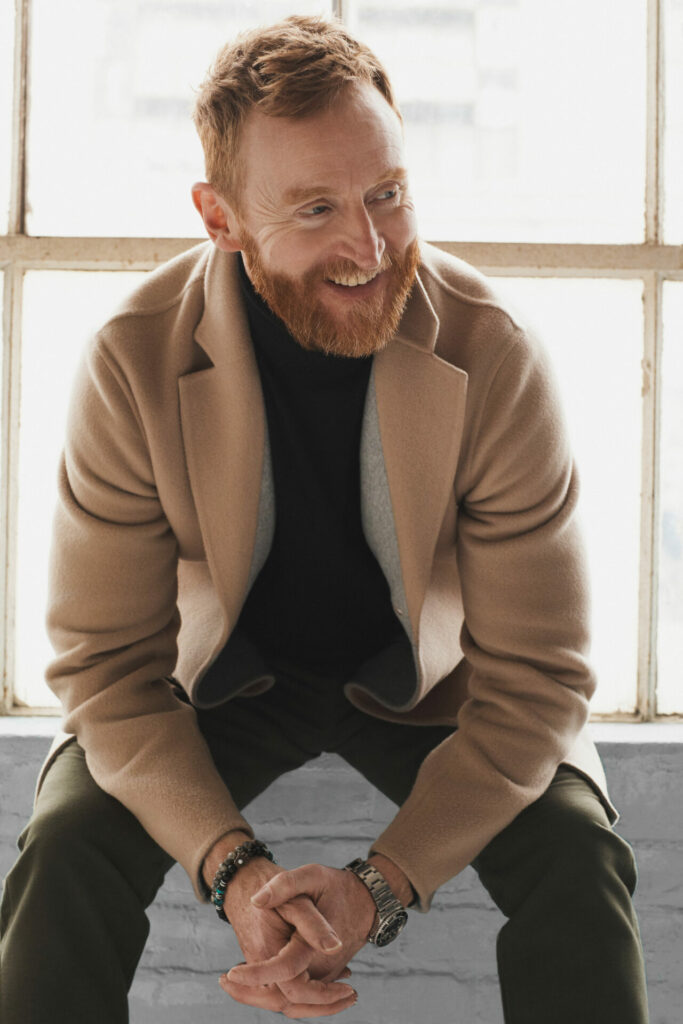
Reflecting on how Lenny was received at the time, Tony thinks it went down well. “I definitely think it was quite surprising. I’ve always been brought up with a very open mind no matter your colour, creed, or sexual preference. Maybe more open-minded than other people. While Lenny started up conversations in the 90s, now it’d be “not redundant,” says Tony. “That wouldn’t be seen as such a big deal as it were at the time.”
Insanely, we still hear occasional stories of young gay actors being told to hide their sexuality. Sometimes actors have been advised against playing gay roles, now and in the past. But Tony was “never” advised against taking the role of Lenny. “Acting is acting no matter if you’re straight or gay or whatever,” he says matter of factly. “The opportunity to play any character gay or otherwise is a great honour. I think things have progressed. Do you think that the LGBTQ+ community will respond [well] to the show?” I think we will.
Mary & George is available on Sky Atlantic and NOW.
